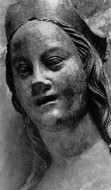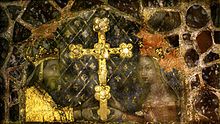Anna von Schweidnitz: Difference between revisions
right- Polish name Anna Swidnica, invented in 20th century, by 2008 used in about 9 books is NPOV?? Centuries of Bohemian Queen,German HRE Empress Name used in 550 books is unimportant?? |
NPOV |
||
| Line 2: | Line 2: | ||
[[Image:Karl_Fourth_Bohemia_Anna_Schweidnitz.jpeg|thumb|Charles IV. and Anne]] |
[[Image:Karl_Fourth_Bohemia_Anna_Schweidnitz.jpeg|thumb|Charles IV. and Anne]] |
||
''' |
'''Anne of Świdnica''' ({{lang-pl|Anna Świdnicka}}, {{lang-de|Anna von Schweidnitz und Jauer}}, {{lang-cs|Anna Svídnická}}) (1339 – [[July 11]], [[1362]] in [[Prague]]) was a [[Queen consort|Queen]] of [[Bohemia]], a German Queen, and an Empress of the [[Holy Roman Empire]]. She was the third wife of Emperor [[Charles IV, Holy Roman Emperor|Charles IV]]. |
||
Anne was the daughter of Duke Henry II of |
Anne was the daughter of Duke Henry II of [[Świdnica]] and his wife, [[Katherine of Hungary]], the daughter of [[Charles I of Hungary]]. Her father died when she was four years old, and her childless uncle, Bolko II, Duke of Schweidnitz-Jauer, became her guardian. She was brought up and educated by her mother at [[Visegrád]] in Hungary. |
||
At the age of 11, Anne had been promised to Wenceslaus, newborn son and successor to Charles IV. After the infant Wenceslaus and his mother [[Anna of Bavaria|Anna of the Palatinate]] died, the now-widowed Emperor asked to marry Anne himself. The planned marriage was part of the strategies devised by Charles and his now-deceased father [[John I of Bohemia|John]] to gain control of the [[ |
At the age of 11, Anne had been promised to Wenceslaus, newborn son and successor to Charles IV. After the infant Wenceslaus and his mother [[Anna of Bavaria|Anna of the Palatinate]] died, the now-widowed Emperor asked to marry Anne himself. The planned marriage was part of the strategies devised by Charles and his now-deceased father [[John I of Bohemia|John]] to gain control of the [[Piast dynasty|Piast]] duchies of Silesia as ''vedlejší země'' ("neighboring countries") for the Kingdom of Bohemia. Anne's uncle, [[Louis of Hungary]] and future King of Poland, was able to assist her by renouncing rights to Schweidnitz in favor of the House of Luxemburg. |
||
At the instigation of archbishop [[Arnošt of Pardubice]], [[Pope Innocent VI]] issued a dispensation for the marriage, which was required because of the degree of relationship between the bride and groom. The two were married on [[27 May]] [[1353]] when Anne was 14; her new husband was 37. |
At the instigation of archbishop [[Arnošt of Pardubice]], [[Pope Innocent VI]] issued a dispensation for the marriage, which was required because of the degree of relationship between the bride and groom. The two were married on [[27 May]] [[1353]] when Anne was 14; her new husband was 37. Beside these two, and Anne's guardian [[Bolko II of Świdnica|Bolko II]], the wedding was attended by: Duke [[Albert II, Duke of Austria|Albert II of Austria]], King Louis of Hungary, Margrave [[Louis VI the Roman|Louis of Brandenburg]], Duke [[Rudolf I, Elector of Saxony|Rudolf of Saxony]], an envoy of King [[Casimir III of Poland]], and an envoy of the [[Republic of Venice]]. |
||
On [[28 July]] [[1353]], Anna was crowned Queen of Bohemia in [[Prague]] by Archbishop [[Ernst of Pardubitz]]. On [[9 February]] [[1354]], in [[Aachen]], she was crowned German queen. As part of the coronation of Charles as [[Holy Roman Emperor]] on [[5 April]] [[1355]], in the Roman [[Basilica of Saint Peter]], Anne was crowned Empress of the Holy Roman Empire. She was thereby the first Queen of Bohemia to become Empress. |
On [[28 July]] [[1353]], Anna was crowned Queen of Bohemia in [[Prague]] by Archbishop [[Ernst of Pardubitz]]. On [[9 February]] [[1354]], in [[Aachen]], she was crowned German queen. As part of the coronation of Charles as [[Holy Roman Emperor]] on [[5 April]] [[1355]], in the Roman [[Basilica of Saint Peter]], Anne was crowned Empress of the Holy Roman Empire. She was thereby the first Queen of Bohemia to become Empress. |
||
Revision as of 14:16, 29 October 2008


Anne of Świdnica (Polish: Anna Świdnicka, German: Anna von Schweidnitz und Jauer, Czech: Anna Svídnická) (1339 – July 11, 1362 in Prague) was a Queen of Bohemia, a German Queen, and an Empress of the Holy Roman Empire. She was the third wife of Emperor Charles IV.
Anne was the daughter of Duke Henry II of Świdnica and his wife, Katherine of Hungary, the daughter of Charles I of Hungary. Her father died when she was four years old, and her childless uncle, Bolko II, Duke of Schweidnitz-Jauer, became her guardian. She was brought up and educated by her mother at Visegrád in Hungary.
At the age of 11, Anne had been promised to Wenceslaus, newborn son and successor to Charles IV. After the infant Wenceslaus and his mother Anna of the Palatinate died, the now-widowed Emperor asked to marry Anne himself. The planned marriage was part of the strategies devised by Charles and his now-deceased father John to gain control of the Piast duchies of Silesia as vedlejší země ("neighboring countries") for the Kingdom of Bohemia. Anne's uncle, Louis of Hungary and future King of Poland, was able to assist her by renouncing rights to Schweidnitz in favor of the House of Luxemburg.
At the instigation of archbishop Arnošt of Pardubice, Pope Innocent VI issued a dispensation for the marriage, which was required because of the degree of relationship between the bride and groom. The two were married on 27 May 1353 when Anne was 14; her new husband was 37. Beside these two, and Anne's guardian Bolko II, the wedding was attended by: Duke Albert II of Austria, King Louis of Hungary, Margrave Louis of Brandenburg, Duke Rudolf of Saxony, an envoy of King Casimir III of Poland, and an envoy of the Republic of Venice.
On 28 July 1353, Anna was crowned Queen of Bohemia in Prague by Archbishop Ernst of Pardubitz. On 9 February 1354, in Aachen, she was crowned German queen. As part of the coronation of Charles as Holy Roman Emperor on 5 April 1355, in the Roman Basilica of Saint Peter, Anne was crowned Empress of the Holy Roman Empire. She was thereby the first Queen of Bohemia to become Empress.
In 1358, Anne bore a daughter, Elisabeth, who was named after Elisabeth I of Bohemia. In February 1361 she became mother of the desired successor to the throne, Wenceslaus, who was born in Nuremberg, and baptized on 11 April in the Sebalduskirche by the Archbishops of Prague, Cologne, and Mainz. She did not live to see the coronation of the two-year old Wenceslaus, however. At the age of only 23 years, she died on 11 July 1362, in childbirth. She is buried in St. Vitus Cathedral. The emperor married Elisabeth of Pomerania one year later. The Duchies of Schweidnitz and Jauer passed to Bohemia after Bolko's death in 1368.
Literature
- Andreas Rüther: Anna von Schweidnitz und Jauer. In: Schlesische Lebensbilder, Bd. VIII, ISBN 3-7686-3501-5
- Th. Vogelsang: Anna von Schweidnitz und Jauer. In: Neue Deutsche Biographie, Bd. 1, Berlin 1953, S. 299
- Peter Moraw: Anna von Schweidnitz und Jauer. In: Lexikon des Mittelalters, Bd. I, München 1980, Sp. 655
- F. Machilek: Anna von Schweidnitz. In: Schweidnitz im Wandel der Zeiten, Würzburg 1990, S. 317-322
